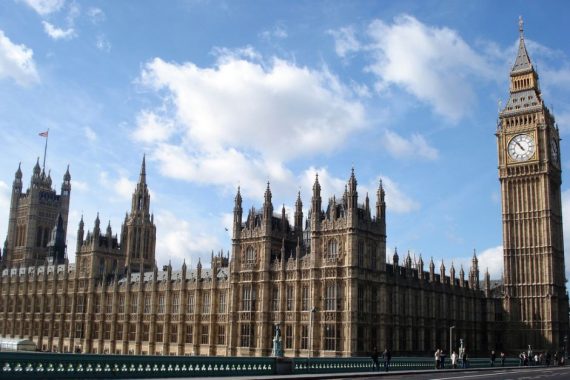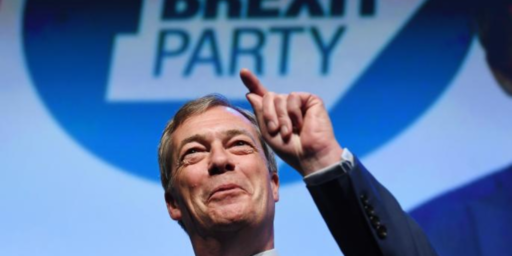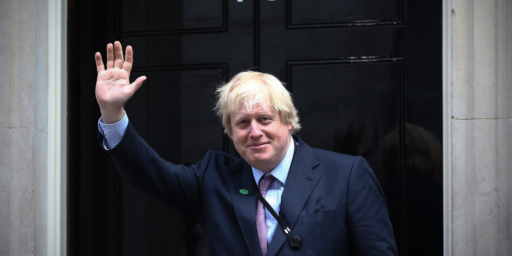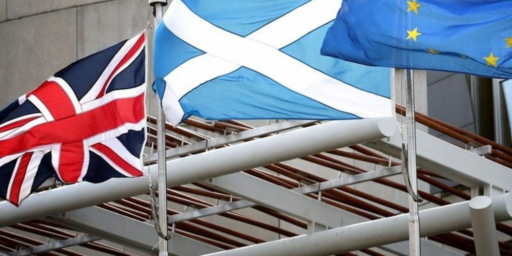British Prime Minister Calls For Snap Election On June 8th
A political surprise in Great Britain as Prime Minister Theresa May calls a snap election for June 8th.
Less than a month after officially beginning the process of exiting the European Union pursuant to the results of last year’s referendum, British Prime Minister Theresa May has called for a snap election in a move that seems clearly designed to enhance her power heading into a negotiation process expected to last the better part of two years:
LONDON — Prime Minister Theresa May stunned Britain on Tuesday by announcing that she would call an early election, placing a bet that voters would give her Conservative Party a strong mandate as her government negotiates the country’s withdrawal from the European Union.
“The country is coming together, but Westminster is not,” Mrs. May said in an unscheduled appearance outside 10 Downing Street, referring to divisions in Parliament. Mrs. May added that she had “only recently and reluctantly come to this conclusion.”
The election would occur on June 8.
Mrs. May had repeatedly ruled out a snap election, so her decision on Tuesday represents an abrupt U-turn.
In calling an early election, she is betting that voters will give the Conservative Party, which holds a slim majority — 330 seats in the 650-member House of Commons — a stronger mandate. The opposition Labour Party is in severe disarray under its hard-left leader, Jeremy Corbyn. Within an hour of Mrs. May’s comments, he said that Labour would welcome an early election — even though many of his critics in the party fear that it will lose seats.
But her announcement is also a huge gamble.
A new election will reopen some of the country’s gravest divisions. It will give Brexit opponents another chance to soften the terms of the withdrawal from the European Union by voting for Liberal Democrat and Labour lawmakers who favor the bloc. It will give the Scottish National Party, which grabbed dozens of seats from Labour in the 2015 national election a new chance to reissue its call for Scottish independence.
If Western democracies have learned anything over the past year, it is that elections are unpredictable. And if Mrs. May wins anything less than a commanding majority on June 8, she will be weakened.
Many Britons may be exhausted from voting, after a referendum on Scottish independence (September 2014), a general election (May 2015) and the Brexit referendum (June 2016). In addition, local elections are scheduled for May 4. (It was too late to piggyback national elections onto the May 4 vote.)
Mrs. May took power in July; her predecessor, David Cameron, resigned after voters narrowly approved a referendum supporting departure from the European Union, a decision known as Brexit.
Last month, Mrs. May formally initiated the two-year divorce process, one of Britain’s most consequential decisions since World War II.
She said her decision to call an election was a response to gridlock created by the opposition.
“In recent weeks, Labour have threatened to vote against the final agreement we reach with the European Union,” she said. “The Liberal Democrats said they want to grind the business of government to a standstill. The Scottish National Party say they will vote against the legislation that formally repeals Britain’s membership of the European Union. And unelected members of the House of Lords have vowed to fight us every step of the way.”
She added: “If we do not hold a general election now, their political game playing will continue.”
But her critics were quick to jump on the reversal.
“This announcement is one of the most extraordinary U-turns in recent political history, and it shows that Theresa May is once again putting the interests of her party ahead of those of the country,” Nicola Sturgeon, the leader of the Scottish National Party, said in a statement. “She is clearly betting that the Tories can win a bigger majority in England given the utter disarray in the Labour Party. That makes it all the important that Scotland is protected from a Tory Party which now sees the chance of grabbing control of government for many years to come and moving the U.K. further to the right — forcing through a hard Brexit and imposing deeper cuts in the process.”
Before today’s announcement, the next General Election was not scheduled to occur until sometime in 2020 thanks to a law called the Fixed Terms Parliament Act which was passed in the wake of the 2010 General Election which sought to limit the frequency of elections in the United Kingdom. That law guarantees a new General Election every five years and sets specific circumstances under which an election can be called early than five years after the most recent election. The first, of course, would be if a majority of the House of Commons were to declare via majority vote that it had ‘no confidence’ in the government, in which case an election would automatically be scheduled unless the no-confidence vote were repealed by subsequent majority vote in favor of the government withing fourteen days. The other method allows the sitting government to call a snap election if it can garner a two-thirds majority in support of such an election from Parliament. Given the fact that the Labour Party’s leader Jeremy Corbyn has announced that it will support the call for an early election, it seems likely that May will get her two-thirds majority. The Liberal Democrats have also announced that they support the call for new elections, although they will only be adding a handful of MPs to the majority given the drubbing that they took in the 2015 General Election. Once that resolution passes, the General Election date will be set, and the campaign will begin on May 8th. As noted, this will be the fourth major election in Great Britain since the Scottish Independence vote in September 2014.
In her speech, May said that she is calling the election in an effort to solidify support for Brexit and thus enhance the bargaining position that she will have heading into the negotiations with the European Union regarding the terms of Great Britain’s exit from the union. While that’ certainly part of it, it’ also clear that she’s taking advantage of the impending Brexit negotiations and her party’s standing in the polls to both legitimize her status as Prime Minister and enhance her party’s position in the House of Commons. Currently, polling indicates that the Tories stand to benefit strongly from a new General Election, with recent polling from both YouGov and The Guardian showing Conservatives with double-digit leads over Labour. If these polls are sustained through June, it would likely translate into strong gains in the House of Commons. This is especially true given the fact that Labour still appears to be in disarray over what has clearly been long-standing and widespread disapproval for Labour leader James Corbyn. While it’s unlikely that Labour voters will all switch sides and vote for the Tories, that dissatisfaction does suggest that they will either stay home or vote for a member of the Liberal Democrats if such a candidate is standing in their constituency. The fact that the Liberal Democrats will apparently use the election to take a stand against a “hard” Brexit, they would seem to be the natural beneficiaries of any disaffected Labour voters, including those who believe that Corbyn has taken the party so far to the left that it can no longer appeal to the average voter in the United Kingdom. This is likely to mean that Labour will lose seats in many of its strongholds. Additionally, Labour is unlikely to gain back many, if any of the seats in lost in Scotland to the Scottish National Party in the 2015 election. Indeed, given the SNP’s recent calls for another Scottish vote on independence, which May has dismissed, it’s likely that Labour will suffer further losses in that region and that Nicola Sturgeon will strengthen her position as she continues to push for another independence vote due to the impending divorce between the United Kingdom and the European Union, which the SNP opposes.
Politically, then, this seems to be a very smart move on May’s part all around. In addition to enhancing her bargaining position heading into the Brexit negotiations, a solid Tory victory in June would also solidify her own political position for the foreseeable future. If it works out, she will not only have a mandate in her own right, as opposed to having inherited one from David Cameron when she won a party leadership election last year, but she will also have made it easier for her to enact more of the government’s agenda outside of Brexit itself. For example, instead of the next General Election being in 2020 a new election this year means that the next General Election would not have to occur until 2022. As Andrew Stuttaford notes, those extra two years could prove to be crucial not just for the Brexit negotiations, but also because it would give the Tories an extra two years after the Brexit process is set to end to set the terms for the post-E.U. United Kingdom. In any case, it’s going to be an interesting two months in the United Kingdom.







This is all about taking advantage of Corbyn’s weakness and Labour’s disarray.
There are some Labour voters who will vote for a Brexit mandate, vote for May, vote for UK breakup, and vote for the execution of the Queen, just to see Corbyn gone. They hate him that much.
Somewhat off topic, but Corbyn’s situation should be taken as a corrective to the Bernie Bros still saying the Dems should have nominated Bernie. I love Bernie, and at far remove I’m fond of Jeremy, but the idea that left populism would have attracted right populists doesn’t seem to be working.
The American National Election Study is out. I expect more intensive analysis will dribble out, but the first take as reported by WAPO via Booman is that racism elected Trump (hoocoodanode), but with a weird curveball,
I’m reminded of the anecdote about the Dem worker in ’08 knocking on a door in W VA. The middle aged white housewife opened the door and was asked who she’d vote for. She hollered back, ‘Bob, who we gonna vote for?’. A faint voice replied, ‘We’re gonna vote for the n****r.’ That’s why left populism doesn’t attract right populists.
Snap!
It’s not just the next two months that will be interesting; it’s gonna be the next two years…..
The EU has stated that they don’t care who’s in charge of England. They just want someone to negotiate Brexit with.
@gVOR08:
Labour was on the verge of imploding until it moved to the center-left ala Bill Clinton’s “third way.” The Brits like the NHS, but across-the-board socialists they are not.
Americans are even further to the right than that.
@gVOR08:
Correlation is not causation. Perhaps some of what looks like racist voting is actually something else. Perhaps this sort of analysis is easier to do for racism than misogyny.
If there is a propensity for racists to be disproportionately misogynists as well, some of what looks like racism might really be misogyny that is being misconstrued.
Looking at the expansion of the gender gap this election, my interpretation is there was beaucoup misogyny in addition to the racism.
@charon:
ETA: It looks to me like there is a strong correlation for Christian Right people, largely Southern and/or rural, to be both misogynist and racist.
They may be tired from voting, but try our system of two-year campaigns.
Just a thought: can we somehow pare our electoral seasons down to two months? That sounds almost civilized.
@charon: Very good. Booman and WAPO noted that the study doesn’t look at misogyny, but that it may well have been a factor, and, as you note, racism may well be a surrogate for misogyny. More detail than I cared to go into for a blog post. I’ll suggest reading my Booman link and from there the WAPO link.
Trump went way past the usual GOP dog whistles on race. I don’t recall that he particularly made an issue of gender on the stump. But he certainly personified misogyny. I wonder if the Access Hollywood tape actually helped him.
A lot of women voted for Trump. That’s puzzled me. But I think Lakoff is right. The strict father frame, which if you read the links is actually what the study looked at as a surrogate for racism, includes a natural order with white men at the top and white women next. IIRC Corey Robin makes the point that conservatives are OK with being well down in the hierarchy as long as someone is below them.
Now you’ve made me go into way more detail than I wanted.
@Hal_10000:
Please, please, please.
“Currently, polling indicates that the Tories stand to benefit strongly…”
Considering that the polls indicated a Brexit loss, my take is that the Torrie benefit may be ephemeral.
@charon:
Before moving to WA last year, I spent 40 years in the Deep South. Racism and Misogyny are big, big factors down there. And boneheaded ignorance, and they’re easy marks for GOP propaganda.
Money and the First Amendment are both acting against this idea, sadly.
But after learning more history, I’m starting to think that it’s not even remotely possible to get big money out of politics. Money is power.
https://www.dissentmagazine.org/article/a-cautious-case-for-socialism
@teve tory:
This is one of the (many) depressing things about Trump…the normalization of Saudi princes, Chinese billionaires, and Russian kleptocrats “buying” American politicians.
Thanks, John Roberts and “conservatives.” Money equals free speech, which even applies to foreign nationals.
27% of the country are doing their stupid best to normalize it. Our job is to fight it.
The US presidential cycle is long because of the electoral college, primary system and size of the country.
The system demands that candidates run a multi-state gauntlet over an extended period. That won’t change.
I’m not a regular consumer of the British press, so does anyone know what makes Corbyn “hard left” and supposedly unacceptable? I keep seeing that description without any context. Does he want to nationalize industries? Abolish the military? Allow unlimited immigration?
And I think it might be more productive to stop obsessing about why other people voted for Trump and start trying to figure out why so many blindly supported a wildly unpopular candidate with little tangible achievements, a long history of awful judgment, and atrocious political skills whose main qualification was her association with the guy most responsible for making the Democratic Party MORE LIKE THE GOP in many horrible ways.
Mike
@MBunge: “It’s dead
JimMike; let it go.”Actually, Britain may have less negotiating power than the Daily Mail readers think it has. The EU is being very careful and moving step by step–but as soon as anything really gets decided by the 26 countries and locked into place, there’s going to be tremendous inertia to keep it that way, no matter what the UK wants.
I got to watch and participate in a whole bunch of negotiations in Japan. Once the group decides, it’s incredibly difficult to change things.
I think May is holding this election in an attempt to grab as much power as she can, because I suspect that negotiations between the UK and the EU are going to be like looking at a rowboat arguing the right of way with an ocean liner.
@MBunge:
A series of pure lies. But, what is even the point, is it not time for ghuls to be preying on more currently relevant meat, she will not be running for anything again.
He should change his handle to Bungeghazi.